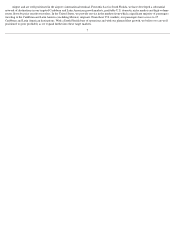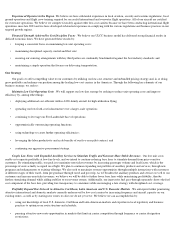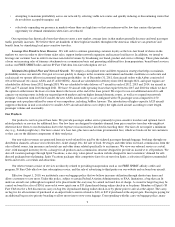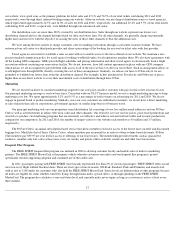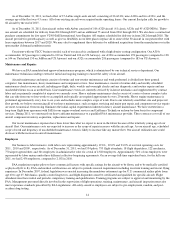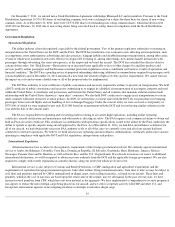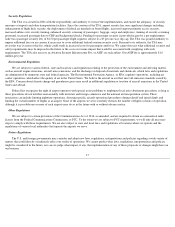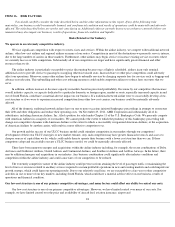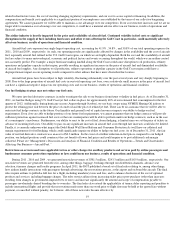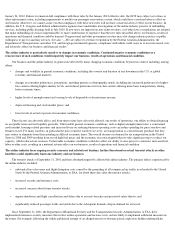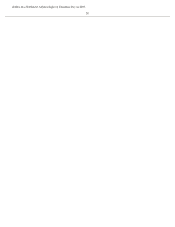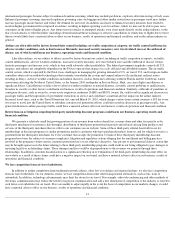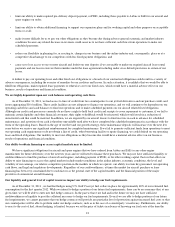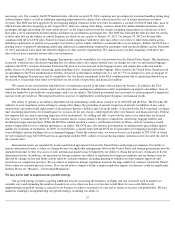Spirit Airlines 2011 Annual Report Download - page 19
Download and view the complete annual report
Please find page 19 of the 2011 Spirit Airlines annual report below. You can navigate through the pages in the report by either clicking on the pages listed below, or by using the keyword search tool below to find specific information within the annual report.
On December 7, 2011, we entered into a Stock Distribution Agreement with Indigo Miramar LLC and its members. Pursuant to the Stock
Distribution Agreement 10,576,180 shares of outstanding common stock were exchanged on a share-for-share basis for shares of non-voting
common stock. As of December 31, 2011, there were 10,576,180 shares of outstanding non-voting common shares, which had decreased to
4,827,600 on February 10, 2012 due to non-voting shares being converted back to voting shares in compliance with the Stock Distribution
Agreement.
Government Regulation
Operational Regulation
The airline industry is heavily regulated, especially by the federal government. Two of the primary regulatory authorities overseeing air
transportation in the United States are the DOT and the FAA. The DOT has jurisdiction over economic issues affecting air transportation, such
as competition, route authorizations, advertising and sales practices, baggage liability and disabled passenger transportation, among other areas,
several of which were included in new rules effective in August 2011 relating to, among other things, how airlines handle interactions with
passengers through advertising, the reservation process, at the airport and on board the aircraft. The DOT has extended the effective date for
certain of these rules. See “Risk Factors—Restrictions on or increased taxes applicable to fees or other charges for ancillary products and
services paid by airline passengers and burdensome consumer protection regulations or laws could harm our business, results of operations and
financial condition.”
The DOT has a pending notice of proposed rulemaking addressing additional accommodations required for passengers with
certain disabilities and on December 21, 2011 announced a new final rule related to flight crew duty and rest requirements. We cannot forecast
the impact on costs and revenues should some or all of the proposed rules be implemented.
The DOT has authority to issue certificates of public convenience and necessity required for airlines to provide air transportation. We hold
a DOT certificate of public convenience and necessity authorizing us to engage in scheduled air transportation of passengers, property and mail
within the United States, its territories and possessions and between the United States and all countries that maintain a liberal aviation trade
relationship with the United States (known as “open skies” countries). We also hold DOT certificates to engage in air transportation to certain
other countries with more restrictive aviation policies. In 2009, we entered into a consent order with the DOT for our procedures for bumping
passengers from oversold flights and our handling of lost or damaged baggage. Under the consent order, we were assessed a civil penalty of
$375,000, of which we were required to pay only $215,000 based on an agreement with the DOT and our not having similar violations in the
year after the date of the consent order.
The FAA is responsible for regulating and overseeing matters relating to air carrier flight operations, including airline operating
certificates, aircraft certification and maintenance and other matters affecting air safety. The FAA requires each commercial airline to obtain and
hold an FAA air carrier certificate. This certificate, in combination with operations specifications issued to the airline by the FAA, authorizes the
airline to operate at specific airports using aircraft approved by the FAA. As of December 31, 2011, we had FAA airworthiness certificates for
all of our aircraft, we had obtained the necessary FAA authority to fly to all of the cities we currently serve and all of our aircraft had been
certified for overwater operations. We believe we hold all necessary operating and airworthiness authorizations, certificates and licenses and are
operating in compliance with applicable DOT and FAA regulations, interpretations and policies.
International Regulation
All international service is subject to the regulatory requirements of the foreign government involved. We currently operate international
service to Aruba, the Bahamas, Colombia, Costa Rica, Dominican Republic, El Salvador, Guatemala, Haiti, Honduras, Jamaica, Mexico,
Nicaragua, Panama, Peru and St. Maarten, as well as Puerto Rico and the U.S. Virgin Islands. If we decide to increase our routes to additional
international destinations, we will be required to obtain necessary authority from the DOT and the applicable foreign government. We are also
required to comply with overfly regulations in countries that lay along our routes but which we do not serve.
International service is also subject to Customs and Border Protection, or CBP, immigration and agriculture requirements and the
requirements of equivalent foreign governmental agencies. Like other airlines flying international routes, from time to time we may be subject to
civil fines and penalties imposed by CBP if unmanifested or illegal cargo, such as illegal narcotics, is found on our aircraft. These fines and
penalties, which in the case of narcotics are based upon the retail value of the seizure, may be substantial. In the past several years, we have
incurred several penalties from CBP, which have not been material in the aggregate. We have implemented a comprehensive security program at
our airports to reduce the risk of illegal cargo being placed on our aircraft, and we seek to cooperate actively with CBP and other U.S. and
foreign law enforcement agencies in investigating incidents or attempts to introduce illegal cargo.
16


